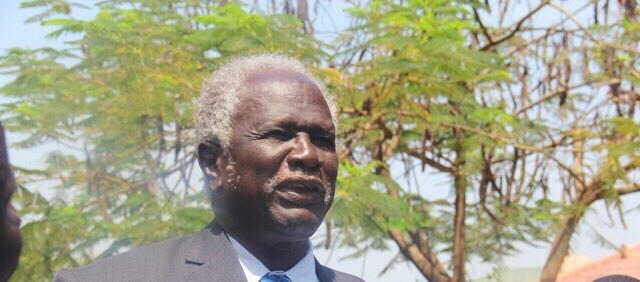Professor Abednego Akok, Chairperson of the National Elections Commission, appointed chairpersons for high elections committees in the country’s 10 states on Wednesday. He mentioned that appointments for the three administrative areas will be made gradually.
The three admintrative areas are Ruweng, Greater Pibor and Abyei.
Speaking to Radio Tamazuj on Wednesday afternoon, Professor Akok confirmed the appointments he made, stating, “Yes, it is true. I made a press statement this morning and announced the chairpersons for the states.”
The chairpersons named are Alphayo Philip Lako for Central Equatoria, Simon Bakama for Western Equatoria, Abdalla Hassan Abididi for Eastern Equatoria and Joseph Akuei for Northern Bahr el Ghazal.
Other officials are Arkangelo Udo for Western Bahr el Ghazal, Jacob Anei for Warrap, Tuor Majok for Jonglei, Kot Kuer for Lakes, Peter Mayom Pur for Upper Nile and George Kuong Gattang for Unity State.
When asked whether the Abyei Administrative Area will participate in the December polls, Prof. Akok explained that residents on the Gogrial side will vote. However, he expressed doubts about the participation of the entire Abyei area due to “insecurity.”
Sudan and South Sudan are disputing the oil-rich Abyei, an area inhabited by Arab Misseriya and Ngok Dinka communities.
In October 2013, the Ngok Dinka community conducted a unilateral popular referendum, in which the vast majority of people voted to join South Sudan. However, neither Sudan nor South Sudan recognized the plebiscite so far.
Prof. Akok stated, “They will vote. Some of those on the Gogrial side will vote, yes. We are not sure yet, but we want to assess the insecurity first.”
The South Sudan Elections law mandates the Chairperson of the National Elections Commission to appoint chairpersons and deputy chairpersons of high committees in the states.
Article 97(4) of the Constitution says the high committees shall be responsible to the Commission in administering and supervising the elections and referendum at the state levels.
The chairperson and deputy chairperson of the high committee work full-time. All other members work on a part-time basis but may be engaged on a full-time basis as the Commission deems necessary.
Each high committee comprises of five members, including the chairperson and deputy chairperson. According to the law, the tenure for high committee members is six years, renewable for one additional term only.




